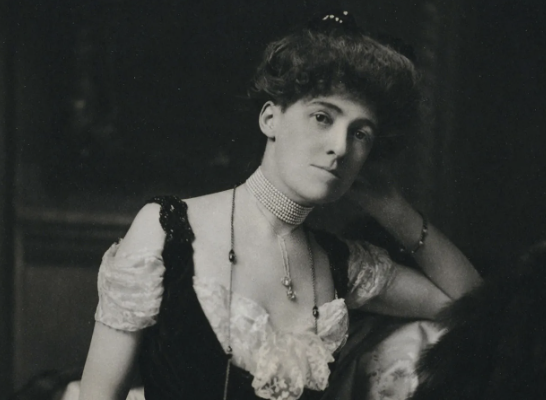As you know, we occasionally like to highlight specific authors throughout the year. One author that everyone knows the name of, but not everyone knows any intimate details about, is Edith Wharton. In the world of literature, Wharton’s literary accomplishments have made her a household name, albeit one usually associated with high school reading requirements! But Wharton wasn’t just a skilled author… despite being born into relative privilege she was also a social commentator who wasn’t afraid to confront the injustice of the social norms of her time! A true force to be reckoned with in the early 20th century.

*
Edith Wharton (born Edith Newbold Jones) was born on January 24th, 1862, in New York City. Wharton’s family belonged to the upper class of New York society, giving her access and opportunity to a world of luxury, culture and high society from a young age. However, her privileged upbringing became a double-edged sword, as her access to the people and views of the upper echelons shaped her perspective on almost all aspects of her life – society, class, love, and gender roles. Her first pieces were published when she was just 15 years old, an English translation of the German poem “Was die Steine Erzählen”, for which she was paid $50. Her family did not wish her name to be published publicly, and her mother refused to allow Wharton to even read novels until she was married. Though occasionally disheartening, these obstacles did not deter young Edith, and at just 16 her father arranged for a book of her poetry to be published under a pseudonym. She also had her poems published in Atlantic Monthly, New York World, and Scribner’s Magazine. Clearly, Wharton was destined for a literary life.
Wharton married Edward “Teddy” Wharton when she was just 23. Teddy was a wealthy banker, and from the outside, it must have looked like a solid match for Edith. Unfortunately, their marriage was fraught with tension… Teddy was not interested nor supportive of Edith’s literary pursuits, and though they shared a love of travel, Teddy’s debilitating depression was eventually too much for Edith. That being said, their travels provided much inspiring worldliness for Wharton’s later works.
Her first novel “The Valley of Decision” was published in 1902, and Wharton never looked back. A few short years later she published “The House of Mirth” (1905), a novel focusing it’s plot on the life of a young high-society woman who sees her life fall apart because she doesn’t adhere to common notions of what she ought to be. Wharton used her own life experiences to criticize the upper class, highlight their insincerity and false superiority – and Wharton gained a name for herself in the literary world. In 1911 she published “Ethan Frome”, further highlighting Wharton’s ability to create evocative worlds with vivid characters, once again imprisoned by their circumstances (though the rural farmer Ethan Frome is a world away from “The House of Mirth’s Lily Bart. More works followed – “The Custom of the Country” (1913), countless poems, and of course, “The Age of Innocence”. The latter being one of Wharton’s most famous works – earning her the Pulitzer Prize for Fiction in 1921. Wharton was the first female to win the award.
Wharton never slowed down. During WWI she was actively involved in relief efforts, organizing charity initiatives to aid refugees in France, and using her fame to help raise funds for the war effort. She addressed social issues and advocated for causes close to her heart – primarily those about gender roles, society and classism. Over her lifetime she produced fifteen novels, seven novellas, eighty-five short stories, books of poetry, books on design and travel. She wrote cultural criticisms, and a memoir. In 1937 she received an honorary Doctor of Letters degree from Yale University. She was the first woman to do so.
Wharton indelibly impacted the American literary world, and her works have reached around the globe. Her frank, descriptive and beautiful prose highlighting the complexities of human nature and the constraints of society are unbelievably realistic. One of the most interesting parts about her writing is how she was able to capture society’s issues from all walks of life – from the poor and downtrodden to the unbelievably privileged elite. Throughout her works Wharton explored the human condition with depth and sensitivity.
Wharton died of a stroke on August 11th, 1937 at a country home in France, but one only needs to pick up one of her works to be transported back in time and live a new human experience.


